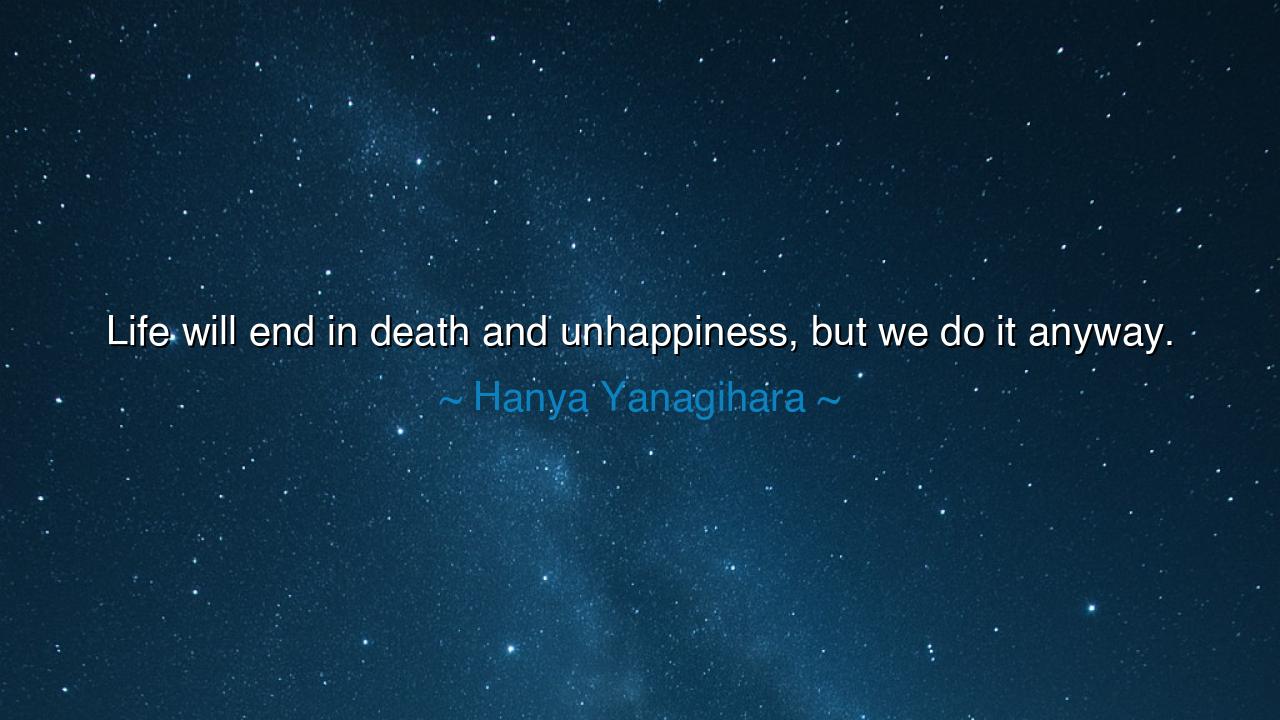
Life will end in death and unhappiness, but we do it anyway.






In the haunting yet luminous words of Hanya Yanagihara, “Life will end in death and unhappiness, but we do it anyway,” there lies a truth as ancient as the dawn of humankind. This is no cry of despair—it is a confession of courage. To recognize that all journeys end in darkness, yet to rise each morning and continue walking, is the highest act of defiance the human spirit can offer. It is the quiet heroism of existence itself: to love though loss is certain, to strive though failure awaits, to live though death is inevitable. Her words shine not as a lament, but as a torch held aloft against the endless night.
The meaning of this quote rests in its paradox: that though life promises suffering and inevitable death, we still choose it. The heart, knowing it will one day break, still opens itself to love. The artist, aware their work will fade, still creates. The parent, knowing their child will one day leave or die, still nurtures. This, then, is the essence of humanity—not the avoidance of pain, but the embracing of life despite it. Yanagihara’s insight is not meant to darken our hearts but to awaken them. For in facing the certainty of loss, we learn the purity of the present. When nothing lasts, everything matters.
The ancients too pondered this mystery. Marcus Aurelius, the philosopher-emperor, wrote in his meditations that “all is ephemeral—fame and the famous alike.” Yet he did not counsel despair, but dignity: to act rightly, to love fiercely, and to accept the impermanence of all things as part of nature’s design. Similarly, the Buddha taught that life is dukkha—suffering—but that wisdom lies not in fleeing it, but in understanding it. To live is to hurt; to love is to lose; to die is to return. Yet, within this cycle lies beauty: the sacred chance to experience being itself. Yanagihara’s words carry this same ancient weight, spoken in the tongue of our modern sorrow.
One might think of Vincent van Gogh, whose life was a storm of beauty and pain. He knew loneliness, rejection, and despair so deep that it consumed him. Yet still he painted—fields of gold, skies of fire, faces alive with soul. He knew his days would end in tragedy, yet he painted anyway. He did not paint because life was kind, but because it was fleeting. Each stroke of his brush was an act of rebellion, a declaration that even if life would end in unhappiness, the act of creation was worth it. His art, born of suffering, became his immortality—and a testament to the power of doing it “anyway.”
The origin of Yanagihara’s sentiment is rooted in her deep understanding of human fragility. Her works, especially A Little Life, dwell in the rawest corners of the human experience—grief, trauma, endurance, and the bonds that hold us upright when everything else falls apart. Through her words, she does not offer escape; she offers truth. She looks into the abyss of mortality and says, “We are doomed, yes—but we are also divine.” Her philosophy is one of acceptance, not surrender. She reminds us that to be human is to build meaning where none is guaranteed, to find light in a universe that gives none freely.
There is a heroism in her bleakness, for it demands honesty. We live in an age that fears discomfort, that hides from death as though denial could protect us. Yet it is only by accepting the certainty of death that we can truly cherish life. The Stoics knew this well—they practiced memento mori, the remembrance of death, not as morbidity, but as motivation. Knowing that time is finite compels us to love with urgency, to speak truth, to create beauty, to forgive, and to live deeply. Death, paradoxically, is what makes life precious. We do it anyway because to not do it would be to betray the gift we have been given.
And so, dear listener, let this be the lesson: do not wait for life to promise you happiness—it never will. Live not for the guarantee of joy, but for the nobility of the attempt. Love, even knowing it will hurt. Create, even knowing it will fade. Dream, even knowing you will fail. The measure of a life is not found in its ending, but in its courage to begin again each day. Every act of kindness, every word of truth, every breath of gratitude is a defiance of despair. That is what it means to “do it anyway.”
In the end, Yanagihara’s words are not an epitaph, but a benediction. They remind us that to live is to walk willingly into impermanence with open eyes and an unbroken heart. Life will end in death and unhappiness—but we do it anyway, because to live, in all its fleeting, aching beauty, is the one miracle we are given. And that, above all, is reason enough.






AAdministratorAdministrator
Welcome, honored guests. Please leave a comment, we will respond soon